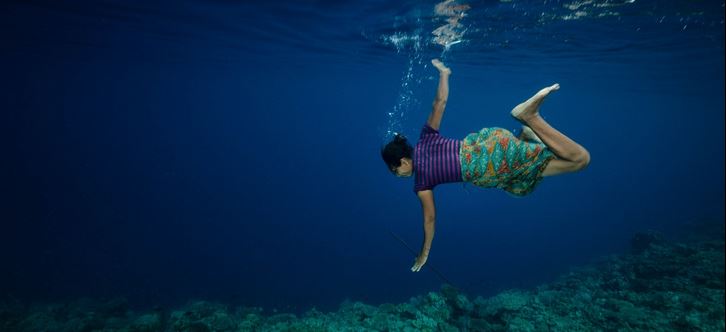
Fisherwomen diving for food in Atauro Island exemplifies a centuries-old tradition where women engage in breath-hold diving to harvest seafood for their communities. Located north of Dili, East Timor, Atauro Island boasts rich marine biodiversity and is home to a resilient community dependent on traditional fishing practices. The fisherwomen, known locally as "asik-asa," skillfully dive without modern diving equipment, relying solely on their breath-holding abilities and knowledge of underwater currents. This sustainable fishing method not only provides essential sustenance but also preserves cultural heritage and fosters community solidarity among Atauro’s inhabitants.
Cultural Significance and Heritage Preservation
The tradition of fisherwomen diving in Atauro Island holds profound cultural significance, reflecting the island’s maritime heritage and the resilience of its indigenous communities. For generations, Atauro’s women have practiced breath-hold diving techniques to sustainably harvest seafood, including fish, octopus, and sea cucumbers, from the island’s pristine waters. This traditional knowledge is passed down through oral histories and practical training, ensuring the preservation of ancestral fishing techniques that have sustained livelihoods and enriched cultural identity for centuries. The asik-asa not only contribute to local food security but also serve as cultural custodians, safeguarding Atauro’s unique heritage and fostering intergenerational knowledge transmission within the community.
Sustainable Fishing Practices
The fisherwomen’s diving practices in Atauro Island exemplify sustainable fishing methods that prioritize ecological balance and resource conservation. Unlike industrial fishing techniques that may deplete marine resources, breath-hold diving minimizes environmental impact by targeting specific species without disrupting marine ecosystems. The asik-asa’s intimate knowledge of local marine habitats and seasonal patterns enables them to harvest seafood responsibly, respecting natural spawning cycles and biodiversity. By adhering to traditional fishing practices, Atauro’s fisherwomen contribute to the island’s ecological resilience and promote sustainable stewardship of marine resources for future generations. Their commitment to sustainable fishing aligns with global efforts to protect marine biodiversity and mitigate the adverse effects of overfishing and habitat degradation.
Economic Empowerment and Community Resilience
Fisherwomen diving for food not only sustain local food security but also contribute to economic empowerment and community resilience on Atauro Island. The seafood harvested by the asik-asa serves as a vital source of protein and nutrition for island residents, particularly in remote coastal villages where access to alternative food sources may be limited. By participating in traditional fishing activities, Atauro’s women divers play pivotal roles in household economies, generating income through the sale or barter of seafood within local markets. This economic autonomy enhances women’s status within the community, fostering gender equity and empowering them as key contributors to family livelihoods and socioeconomic stability. The collective reliance on traditional fishing practices strengthens social cohesion and resilience among Atauro’s inhabitants, promoting solidarity and mutual support in times of economic uncertainty or environmental change.
Challenges and Adaptations in Modern Times
Despite its cultural and ecological benefits, the practice of fisherwomen diving faces contemporary challenges in Atauro Island’s evolving socio-economic landscape. Factors such as population growth, changing dietary preferences, and external market pressures have influenced traditional fishing dynamics, altering the sustainability and viability of subsistence fishing practices. Additionally, environmental stressors, including climate change and marine pollution, pose threats to marine ecosystems and challenge the resilience of Atauro’s traditional fishing communities. In response to these challenges, local initiatives and community-led conservation efforts seek to integrate traditional knowledge with modern sustainable practices, ensuring the continued relevance and effectiveness of fisherwomen diving as a viable livelihood strategy and cultural tradition in a rapidly changing world.
Environmental Conservation and Marine Stewardship
The asik-asa’s commitment to sustainable fishing aligns with broader efforts to promote environmental conservation and marine stewardship in Atauro Island. By practicing selective harvesting and respecting marine biodiversity, fisherwomen contribute to the preservation of healthy ecosystems and the protection of endangered species within Atauro’s marine protected areas. Community-led initiatives, such as marine conservation projects and ecotourism ventures, seek to enhance local awareness of marine conservation principles and empower fisherwomen as advocates for sustainable fishing practices. Through collaborative partnerships with government agencies, non-governmental organizations, and international stakeholders, Atauro’s fishing communities strive to achieve sustainable development goals while safeguarding their cultural heritage and natural resources for future generations.
Vote
Who is your all-time favorite president?
Cultural Tourism and Community Engagement
The traditional fishing practices of Atauro’s fisherwomen also hold potential for cultural tourism and community engagement, offering visitors unique opportunities to experience authentic maritime traditions and participate in sustainable fishing activities. Cultural tourism initiatives, such as guided diving tours led by local asik-asa, promote cross-cultural exchange and generate income for community-led conservation efforts and economic development projects. These initiatives not only showcase Atauro’s rich cultural heritage and natural beauty but also empower local communities to diversify livelihoods and harness tourism as a tool for socio-economic empowerment. By preserving and promoting traditional fishing knowledge, Atauro’s fisherwomen play pivotal roles as cultural ambassadors, sharing their ancestral wisdom and maritime traditions with global audiences while fostering mutual respect and understanding across diverse cultural landscapes.
Future Prospects and Community Resilience
Looking ahead, the future prospects for fisherwomen diving in Atauro Island hinge on sustainable development strategies that balance cultural preservation, economic empowerment, and environmental conservation. Community-driven initiatives that promote sustainable fishing practices, strengthen local governance structures, and enhance resilience to climate change are essential for safeguarding Atauro’s marine ecosystems and cultural heritage. Empowering women as leaders in marine stewardship and sustainable tourism initiatives can amplify the positive impacts of fisherwomen diving, fostering inclusive growth and equitable development in coastal communities. By leveraging traditional knowledge, innovation, and collaborative partnerships, Atauro’s fisherwomen and their communities can navigate challenges and seize opportunities for sustainable livelihoods, cultural revitalization, and resilient futures grounded in harmony with the ocean’s bounty.